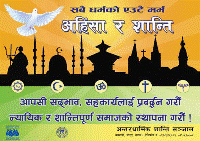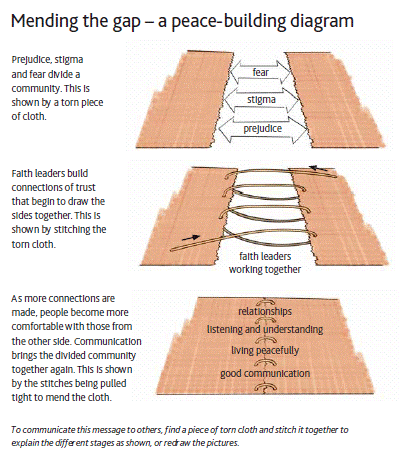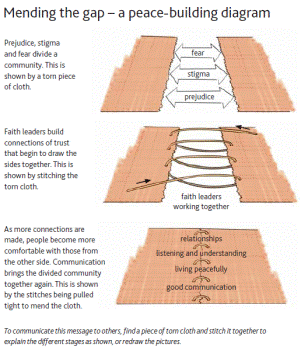Prejudice between different groups is the beginning of what can grow into serious division, conflict and often violence. Both sides feel misunderstood and shut out by the other. Each feels more comfortable among ‘their own people’. This is fertile ground for those who have extreme views on both sides to spread rumour and create fear.
In one town in Eastern Nepal, a group of local faith leaders representing the five different faiths in the town decided that the time had come to take action. No longer would they allow those with extreme views to set the tone for community relationships. The attacks and counter-attacks had gone far enough.
The leaders formed an interfaith group for peace. This was not a group to promote interfaith worship, or blend one faith into another. No, this group agreed to take action and work for peace. They decided to focus on the harm done to the community rather than on bad people doing bad actions. They wanted to build a peaceful community that showed tolerance and respect for all those who called the town their home.
It took several months to get involvement from all the faith groups, because people did not know or trust others from different faith groups. Despite living in the same town, very often these faith leaders had never really met. They and their people had lived parallel lives, with little or no contact between them. Within their town their people had been growing apart.
Starting to learn
With ongoing support and advice from the staff of the United Mission to Nepal, slowly the level of trust was raised. The leaders learned that all their faiths had significant teaching about peace and relationships with others, and they realised these truths had never been truly taught to the people. They learned about the faith practices and festivals of the others. They had opportunities to ask questions: questions with the aim of learning, not questions designed to accuse or undermine the other faith.
Each leader in turn needed to reassure friends and family in their own faith group that they were not ‘watering down’ or changing their faith. From time to time each was invited to bring others from their faith group to spread the conversation further and to widen the influence of the group. Training was given in mediation and negotiation skills. Most importantly, time was given to build confidence and trust among the group.
Acting together
Over time, relationships in the interfaith group were established and trust and respect were restored. The right moment had come to take action for peace. The faith leaders worked on projects together, arranging rallies and parades to celebrate international peace day and to celebrate the signing of Nepal’s peace agreement. They produced interfaith posters and leaflets for use in schools and community settings. They took every opportunity to be seen together and were not ashamed of their new friends. For example, Christians visited Muslim schools and Muslims visited Hindu schools, distributing and explaining the poster they had designed together.
Now their aim is to maintain and nurture these relationships and allow them to become part of the life of the community. It is not beginning a good work but continuing it that will give the best results. The faith leaders hope that over time, violence will be reduced and people will be more comfortable living closer to one another, understanding and occasionally even joining the festivals and holidays of the others. A community is being established where each faith group feels the respect and recognition of the others. The leaders’ aim is that fears and negative talk about minority groups will become a thing of the past.
The challenge
Most of us would rather not get involved in interfaith groups. We make excuses and at times act and behave as though we believed all the rumour and prejudice. Yet in our hearts we know this is not the way God wants our world to be. When we behave with respect and love towards the other, the stranger, then his love can reach out over and beyond us to bring healing and hope to people caught in a cycle of fear and violence. Jesus really did say, ‘love your enemies’ – and he practised it himself.
Joe Campbell has been active in community relations and peace-building work for over 25 years. He is from Northern Ireland and has worked with leaders and divided communities in Northern Ireland, England, the Balkans and the Middle East, as well as more recently in Nepal with United Mission to Nepal.












